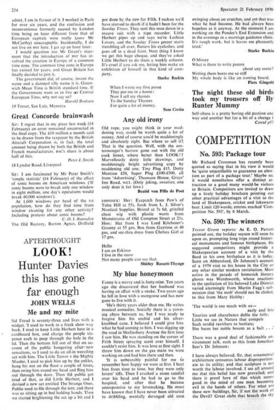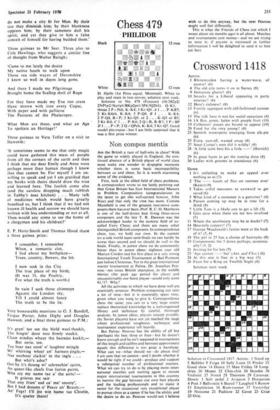COMPETITION
No. 593: Package tour
Mr Richard Crossman has recently been quoted as saying that in his view it would be 'quite unjustifiable to guarantee an abor, tion as part of a package tour.' Maybe so; it would nonetheless offer a distinct at- traction to a good many would-be visitors to Britain. Competitors are invited to draw up a lively holiday brochure pointing out other practical advantages of a visit to the land of Shakespeare, cricket and lukewarm beer. Limit 120 words; entries, marked 'Com- petition No. 593', by 6 March.
No. 590: The winners
Trevor Grove reports: As E. 0. Parrott pointed out, the holiday season will soon be upon us, prompting long trips round histori- cal monuments and famous birthplaces. He suggested competitors might provide a Shakespearian account of a visit by the Bard to his own birthplace as it is today, Scott on Abbotsford, Dr Johnson's account of a 1970 visit to his house in the City or any other similar modern revisitation. Most active in the parade of homesick literary ghosts was Wordsworth, whose reactions to the spoliation of his beloved Lake District varied alarmingly from Martin Fagg's sub- mission that 'the mob' should not be chided, to this from Mary Holtby : 'The world is too much with us— early and late Tourists and charabancs defile the fells: Little we see in Nature that compels Such sordid ravishers to hesitate; She bares her noble bosom as a bait . .
There was a good deal of fashionable en- vironment talk, such as this from Jonathan Seer's Dr Johnson: I have always believed, Sir, that ornamental architecture consumes labour disproportion- ate to its utility; and that sculpture is not worth the labour involved. I see all around me that this belief has now prevailed; and there is proof here of that which seems good in the mind of one man becoming evil in the hands of others. For what are these new buildings, Sir, if not the work of the Devil? Great slabs that breach the sky
do not make a city fit for Man. By their size they diminish him; by their blankness oppress him; by their sameness dull his spirit; and yet they give to him a false conceit of himself for having builded them.'
Three guineas to Mr Seer. Three also to Cole Hawlings, who suggests a similar line of thought from Walter Ralegh: `Came to me lately the desire My native heath to walk upon Those sea side wayes of Devonshire I knew so well in dayes long gone.
And there I made my Pilgrimage Brought home the Scallop shell of Rage For they have made my Exe run crass Have strewn with iron every Copse, With paper and with palliasse The Pastures of the Phalaropes.
What Men are these, and what an Age To spoliate an Heritage!'
Three guineas to Vera Telfer on a visit to Haworth: 'It sometimes seems to me that only magic could have gathered this mass of people from all the corners of the earth and then I think that my dear Emily and Anne were perhaps more than human though I know that that cannot be. For myself I am un- willing to speak and yet I am gratified that my books with theirs should draw the wise and learned here. The foolish come also (and the careless dropping much rubbish in Tabby's neat kitchen) . . . Many talk of medicines which would have greatly benefited us, but I think that if we had not known ill health and sorrow we should have written with less understanding or not at all. Then- would any come to see the home of a clergyman and his children?'
E. P. Heriz-Smith and Thomas Hood share a three guinea prize: I remember, I remember When, a romantic clot, I lied about my birthplace— Trees, country, flowers, the lot.
I now seek in the City The true place of my birth; (It was 31, the Poultry, For what the truth is worth.) In vain I seek those chimneys Against the London sky, Till I could almost fancy The truth to be the lie.
Very honourable mentions to G. J. Bundell, Fergus Porter, John Digby and Douglas Hawson; and a final three guineas to P.M.: It's gran' tae see the bield weel-theekit, The hingin' door noo firmly steekit, Clean windies whaur the bairnies keekit,— But eerie, tee, Tae hear nae soun' o' laughter mingle Wi' whirring wheel an' harness-jingle,— Nae neebour claikin' in the ingle . . .
But whit's adee?
Oot-by it's thrang wi' schreechin' cairts, An queer-like chiels frae furrin pairts, Wha cry my name tae a' the airts!- It grieves me sair That ony frien' sud ca' me' snooty', But I had dreams o' Peace an' Beauty,— An' Fegs! I'll jist win hame tae Clootie, It's quater there!



































 Previous page
Previous page